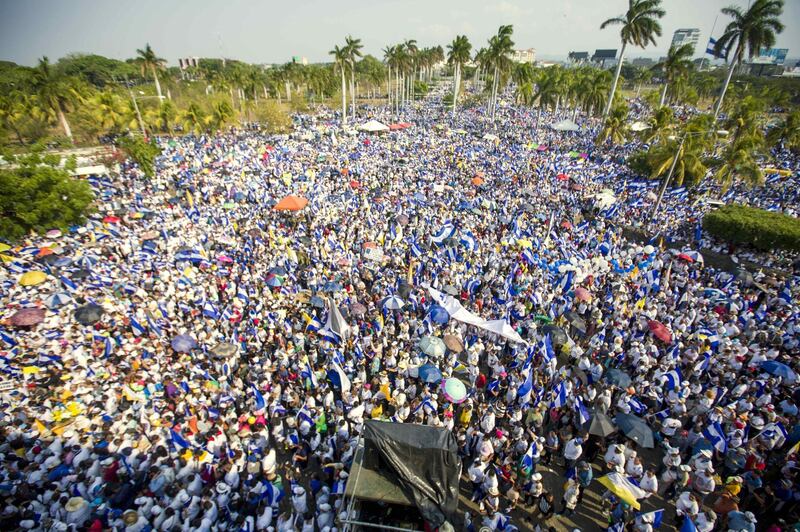In 1979, the long decades of the Somoza family dictatorship in Nicaragua finally came to an end. Its last scion, Anastasio Somoza, fled into exile in Paraguay, only to be assassinated by a Sandinista hit team the following year. Few mourned his passing. Even by the standards of Latin American dictatorships, his regime had been particularly unpleasant. His attitude towards his people was reflected in his infamous words: “I don’t want an educated population, I want oxen.”
He was, literally, a bloodsucker – a company he part-owned collected blood plasma every morning from some of the country’s poorest and most desperate for sale abroad. In the end, the US, which had a policy of ignoring the excesses of dictators so long as they stemmed the spread of Soviet influence, could stomach his regime no more and cut off support.
One of the key figures in the Nicaraguan revolution was a 33-year-old Sandinista named Daniel Ortega. He soon became the country’s effective leader and while, over the following 11 years, the Reagan administration was ever more critical of Nicaragua’s close ties to Cuba and other revolutionary movements, to the point of funding the anti-Sandinista Contra rebel group (leading to the Iran-Contra arms scandal), many around the world looked sympathetically on Mr Ortega.
He won the presidency in 1984 in an election that was described by independent US observers as "free, fair and hotly contested". Literacy rates soared. The World Health Organisation lauded his government’s record in extending the reach of the public healthcare system. When he lost the 1990 election, Mr Ortega accepted the result.
Fast forward to the present day and Mr Ortega is back in power, as he has been since 2007. And the tragedy of his second period in office is that it has been so marked by abuses that protestors in the streets of Managua, the country's capital, have been chanting: "Ortega, Somoza, son la misma cosa", which translates as: "Ortega, Somoza, are the same thing".
Explanations for the anger range from the immediate – a very unpopular pensions reform – to the longer term. Mr Ortega, says the Washington Post, "has spent more than a decade dismantling Nicaragua's democracy". The discontent is serious. Mr Ortega might not fall but 30 protestors have already died in his attempts to quell the unrest thus far.
He has turned into an unfortunately familiar figure – the leader who hungers for and clings to power too long, in the process often becoming precisely the kind of repressive leader he once fought to evict from power.
There are many such examples. Most of the world now remembers the late Ferdinand Marcos as a dictator who looted $10 billion from the Philippines and whose 21-year rule ended when he had to flee during the People Power Revolution of 1986.
Yet earlier, he was viewed as a charismatic reformer who pledged to upset a rotten system that benefited the old elites and not the masses. As Juan Ponce Enrile, the former senate president who helped lead the armed forces to the side of the revolution put it, if the martial law that Mr Marcos had instigated in 1972 had ended in 1977, the latter "would have been enshrined as the best president the country ever had".
_______________________
Read more from Sholto Byrnes:
[ Kim Jong-un has no incentive to denuclearise. The sooner Trump realises that, the better ]
[ With Brexit looming, Britain is looking for new Commonwealth allies ]
[ How to win friends and influence people, the Soros way ]
_______________________
Along with many other “strongmen” in Africa, Zimbabwe’s Robert Mugabe was initially highly regarded. Well-educated and articulate, Mr Mugabe came across well in the international media and if he had stepped down after a decade as leader in 1990, his good standing might well have remained intact.
Instead, he grew increasingly autocratic and turned a country with enormous potential, known as the breadbasket of southern Africa, into a basket case, until he was finally overthrown at the age of 93 by the army last November.
In Malaysia, 92-year-old Dr Mahathir Mohamad is seeking, just as Mr Ortega did, another return to power. Bridget Welsh, a long-term observer of the country's politics, recently wrote that "the sense of relief when Mahathir stepped down from office in 2003 was palpable", accusing him of undermining "the democratic fabric of Malaysia". But had he gone into a graceful retirement most in Asia – perhaps not in the West – would have been kind about his record and would not have delved too deeply into the more dubious aspects of his 22-year rule.
But Dr Mahathir is another who is unable to accept relinquishing control. Having ousted one successor for not doing his bidding, he is now trying to do the same to the current prime minister, Najib Tun Razak – and as a result all his dirty laundry is being thoroughly aired, scandals are being re-examined and his past authoritarian excesses re-debated, to the detriment of his reputation and to the health of Malaysian democracy (which would surely be better served by an opposition leader of more tender years).
The lesson is clear. After too long in power, leaders tend to feel unconstrained by democratic norms. Checks and balances are trampled and dictatorial tendencies emerge.
If Mr Marcos, Mr Mugabe and Dr Mahathir had embraced retirement, they could all have been men of global stature, elder statesmen whose wisdom and judgement would have been widely sought. Instead, the darker sides of their long rules are remembered.
It is sad that Daniel Ortega has joined them in this category – but it is saddest of all for the people of Nicaragua, whom he once served well and with a bravery that deserves to be his true memorial, rather than the broken one he is currently forging.
Sholto Byrnes is a senior fellow at the Institute of Strategic and International Studies Malaysia





